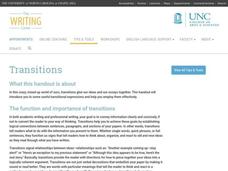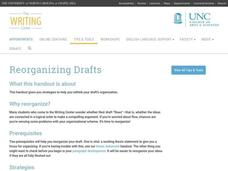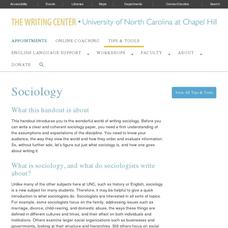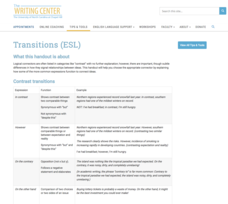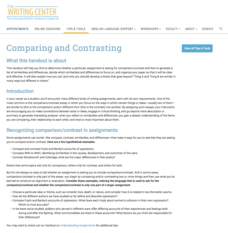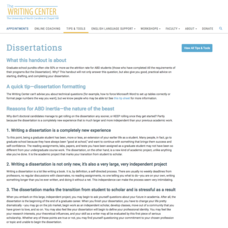University of North Carolina
Transitions
Ideas don't naturally flow from one to another. They need transitions to help them connect. Part of a larger Writing the Paper series, the resource introduces writers to the concept of using transitions in their writing. Topics covered...
University of North Carolina
Reorganizing Drafts
Poor organization often destroys an otherwise good paper. After writing a first draft, individuals consider the organization of ideas, a topic discussed in the 16th handout in the 24-part Writing the Paper series. The resource covers...
American Museum of Natural History
What's This? Reproduction
Attracting the right mate is as important for humans as any other species. An interesting lesson teaches individuals about several strategies that animals and plants have adapted to attract their mates. From colorful nests to powerful...
ProCon
Illegal Immigration
Should immigrants who illegally reside in the United States be eligible for citizenship? With information about undocumented immigrant population estimates, sanctuary cities, and unaccompanied immigrant children, pupils consider the pros...
University of North Carolina
Paragraph Development
There's no set length for a good paragraph, but the short block of text should contain key components. A handout on paragraphs, the 12th in a series of 24, outlines a five-step process for paragraph development. Additionally, the handout...
University of North Carolina
Literature (Fiction)
An informative installment of the Writing for Specific Fields series helps readers learn how to interpret and write about fiction. The website details nine easy steps for writing a literary analysis—a useful method for all readers!
American Museum of Natural History
What's This? Feeding
Some species have pretty creative methods for catching food. Young scientists learn about some interesting ways organisms get the nutrients they need by navigating an online interactive lesson that would be suitable for a remote learning...
Biology in Motion
Evolution Lab
Evolution occurs though change over time, but can it go any faster? Scholars speed up the process of evolution and observe a simulation of 20 blue organisms fighting for survival. A graph displays the changes in phenotype over time. By...
Judicial Learning Center
Levels of the Federal Courts
The Supreme Court gets all the glory, but very few federal cases make it to the highest court. An interesting lesson explores the structure of the lower levels of the federal court system. In addition to outlining the organization of...
Judicial Learning Center
State Courts vs. Federal Courts
Popular culture often portrays the Feds as the most fearsome of law enforcement agencies. Yet, someone charged with a crime is considerably more likely to end up in a state court. The lesson, one of six covering the Organization of the...
University of North Carolina
Psychology
Psychology, the scientific study of the human mind and behavior, is a popular major for many college students. An informative handout outlines common assignments in psychology courses. Scholars see how to design a research proposal,...
American Museum of Natural History
The Tree of Life
Groups of species can have more in common than meets the eye. An interactive cladogram shows some of the connections between important groups of species. Learners click on sections of the diagram to learn more about the connections or on...
University of North Carolina
Sociology
What exactly does sociology entail? Sociology is a broad field that covers many topics, including culture, mass media, and social movements. A helpful handout prepares scholars for typical writing found in college-level sociology...
ProCon
Euthanasia and Assisted Suicide
Should physician-assisted suicide be legal? Using a debate topics website, pupils prepare to discuss the morality and legality of euthanasia. Scholars discover historical case studies involving assisted suicide, explore state-by-state...
American Museum of Natural History
They Glow!
Would you believe marine animals can make their own light? An online resource describes the process of bioluminescence and how animals in the ocean use it to survive. The lesson features a catchy tune that describes the behavior of ocean...
American Museum of Natural History
They Glow!
Let there be light! An interactive online lesson describes the process of bioluminescence and how ocean species use it to their advantage. The lesson highlights several specific species as well as provides vocabulary support with...
Biology in Motion
Organize-It
Many pupils struggle to categorize and organize related content. Multiple quizzes on a variety of topics offer practice for these specific skills. Scholars move items around until they think each is placed in the proper position....
University of North Carolina
Drama
Watching a theatrical production can profoundly impact a person, but how would one convey the experience in writing? A handout helps readers organize their ideas and effectively write about plays, productions, and performances. Scholars...
University of North Carolina
Religious Studies
What is the difference between religion and religious studies? Readers find out after reading an online handout. It outlines common assignments in religious studies classes, such as critically evaluating religious texts and writing...
University of North Carolina
Transitions (ESL)
When it comes to comparing and contrasting in an essay, looking at a chart and picking a random transition word may not do the trick. As explained in an informational writing handout, the words writers use to move from one idea to...
University of North Carolina
Verb Tenses
Twelve categories of verbs exist in the future tense, ranging from simple present to future perfect progressive, but only three have a place in academic writing. Those three tenses make up the content of an informational handout that...
University of North Carolina
Comparing and Contrasting
Not all compare and contrast assignments have writers compare and contrast in the same way. Some only ask for comparisons, others only ask for contrasts, and many require more focus than a simple list of similarities and differences....
University of North Carolina
Dissertations
Bring on the coffee—it's dissertation time! As a handout on dissertations explains, over 50 percent of PhD candidates never finish their dissertations. The handout, part of a larger series on specific writing styles, helps motivate...
University of North Carolina
Essay Exams
For decades, the sight of blue books has struck fear in the hearts of collegians. Those books usually signal an essay exam, the topic of one of the handouts in a larger series on specific writing assignments. Using the handout, writers...
Other popular searches
- Graphic Organizers
- Biography Graphic Organizer
- Main Idea Graphic Organizers
- Vocabulary Graphic Organizer
- Story Map Graphic Organizer
- Science Graphic Organizers
- Setting Graphic Organizer
- Math Graphic Organizers
- 4 Square Graphic Organizer
- Sample Graphic Organizers
- Comic Book Graphic Organizer
- Graphic Organizer Legend
